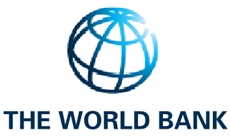World Bank sees global financial turmoil in 2016
07 Jan 2016
The risk of the global economy being battered by a ''perfect storm'' in 2016 has been highlighted by the World Bank in a flagship report that warns that a synchronised slowdown in the biggest emerging markets could be intensified by a fresh bout of financial turmoil.
 The Bank said the possibility that Brazil, Russia, India, China and South Africa – the so-called Brics economies – could all face problems simultaneously would put in jeopardy the chances of a pick-up in growth in the coming year.
The Bank said the possibility that Brazil, Russia, India, China and South Africa – the so-called Brics economies – could all face problems simultaneously would put in jeopardy the chances of a pick-up in growth in the coming year.
It added that the impact would be heightened by severe financial market stress of the sort triggered in 2013 by the announcement by the Federal Reserve that it was considering reducing the stimulus it was then providing to the US economy.
Launching its annual Global Economic Prospects, the Bank said activity in 2015 had failed to live up to its expectations – the fifth year in a row that growth has undershot the forecasts made by the Washington-based institution, which lends to the world's poorest countries.
The Bank said growth had slowed to 2.4 per cent in 2015, from 2.6 per cent in 2014, but added that a stronger performance in developed countries should lead to 2.9 per cent growth this year.
''Downside risks dominate and have become increasingly centred on emerging and developing countries,'' it said.
India to be robust
The Bank is predicting that recessions in Brazil and Russia will bottom out in 2016; that China will experience only a modest growth slowdown from 6.9 per cent to 6.7 per cent and that India will continue to expand at a robust pace.
The report said that, in a development unmatched since the 1980s, most of the largest emerging market economies were slowing at the same time. Sharp declines in commodity prices, subdued global trade, weaker capital flows and currency pressures had combined last year to create a ''particularly challenging external environment for commodity exporters'', where most of the growth slowdown had occurred.
 The Bank has estimated that growth in developing countries reached a post-crisis low of 4.2% in 2015, down from 4.9 per cent in 2014, and warned that 2016 could be another difficult year.
The Bank has estimated that growth in developing countries reached a post-crisis low of 4.2% in 2015, down from 4.9 per cent in 2014, and warned that 2016 could be another difficult year.
In the event that growth in the Brics economies fell one percentage point short of expectations, the Bank said this would knock 0.8 points off growth in other emerging markets and reduce growth in the global economy by 0.4 per cent.
But the Bank also highlighted the risks of what it called a perfect storm. ''Spillovers could be considerably larger if the Brics growth slowdown were combined with financial market stress.
''If, in 2016, Brics growth slows further, by as much as the average growth disappointment over 2010-14, growth in other emerging markets could fall short of expectations by about one percentage point and global growth by 0.7 percentage points.
''If such a Brics growth decline scenario were to be combined with financial sector turbulence, emerging market growth could slow by an additional 0.5 percentage points and global growth by an additional 0.4 percentage points.''
Jim Yong Kim, the Bank's president, said, ''More than 40 per cent of the world's poor live in the developing countries where growth slowed in 2015. Developing countries should focus on building resilience to a weaker economic environment and shielding the most vulnerable. The benefits from reforms to governance and business conditions are potentially large and could help offset the effects of slow growth in larger economies.''
The Bank said it expected the growth rate in the Middle East and North Africa region to more than double as a result of the ending of sanctions against Iran and an end to declining oil prices. ''Growth is forecast to accelerate to 5.1 per cent in 2016 from 2.5 per cent in the year just ended, as the expected suspension or removal of economic sanctions against the Islamic Republic of Iran will allow that country to play a larger role in global energy markets. Growth is expected to pick up in other oil exporters as well, predominantly on the assumption that oil prices will stabilize.''
More stable commodity prices should also help Africa, the Bank added, predicting growth to pick up from 3.4 per cent in 2015 to 4.2 per cent in 2016.



















